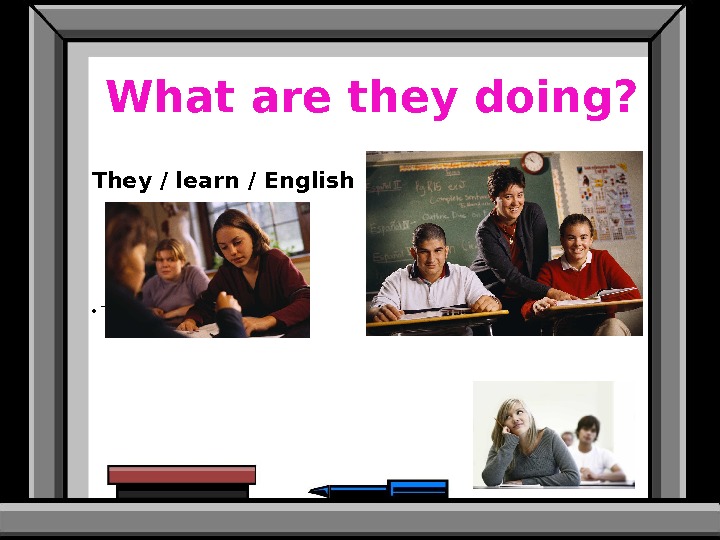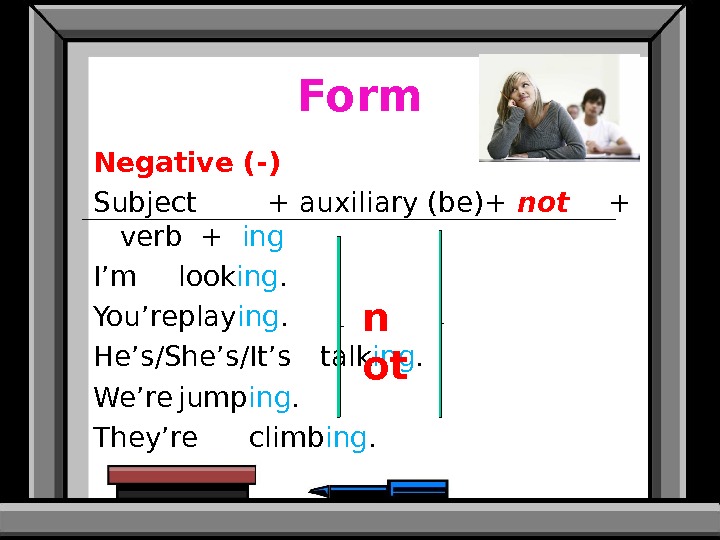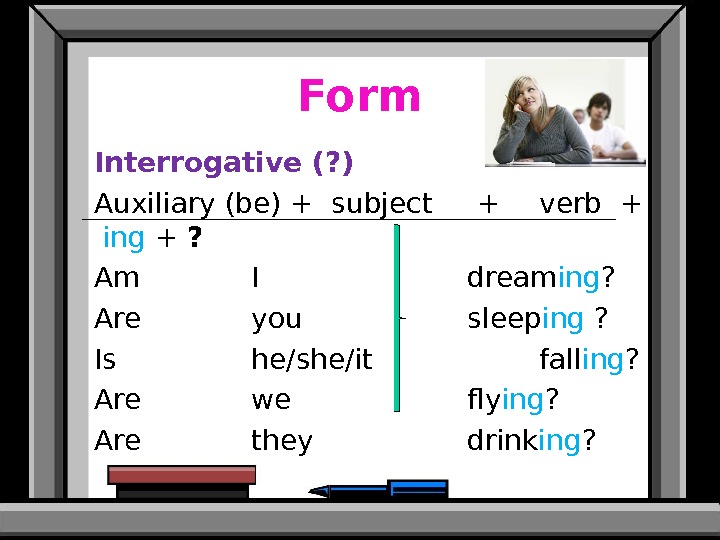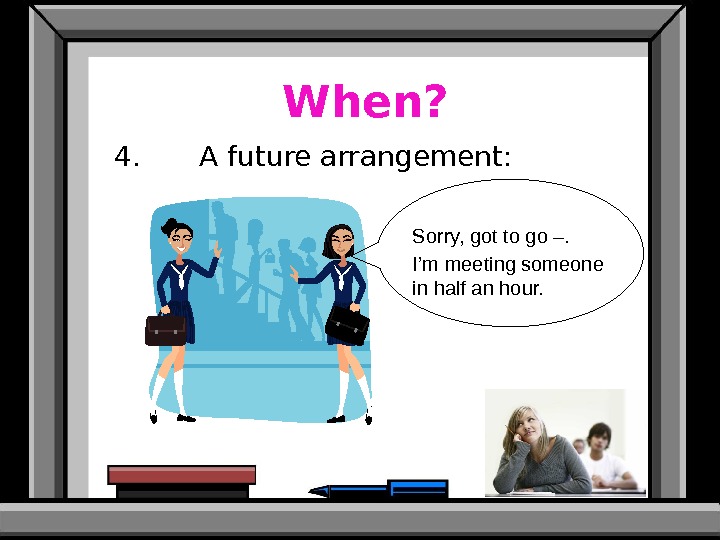Презентация present-continuous-final
























- Размер: 2.7 Mегабайта
- Количество слайдов: 23
Описание презентации Презентация present-continuous-final по слайдам

 What is she doing? She / read / book • She is reading the book. • She’s reading a book.
What is she doing? She / read / book • She is reading the book. • She’s reading a book.
 What is he doing? He / listen / music • He is listening to music. • He’s listening to music.
What is he doing? He / listen / music • He is listening to music. • He’s listening to music.
 What are they doing? They / study • They’re studying. • They are studying.
What are they doing? They / study • They’re studying. • They are studying.
 What are they doing? They / work • They’re working. • They are working.
What are they doing? They / work • They’re working. • They are working.
 What are they doing? They / learn / English • They are learning English. • They’re learning English.
What are they doing? They / learn / English • They are learning English. • They’re learning English.
 What are we doing? We / smile • We’re smiling!
What are we doing? We / smile • We’re smiling!
 What am I doing? I / type • I’m typing.
What am I doing? I / type • I’m typing.
 What are you doing? You / behave / badly • You’re behaving badly!
What are you doing? You / behave / badly • You’re behaving badly!
 Form Positive (+) Subject + auxiliary (be) + verb + ing I am = I’m walk ing. You are = You’re read ing. He/She/It is = He’s/She’s/It’s eat ing. We are = We’re laugh ing. They are = They’re shout ing.
Form Positive (+) Subject + auxiliary (be) + verb + ing I am = I’m walk ing. You are = You’re read ing. He/She/It is = He’s/She’s/It’s eat ing. We are = We’re laugh ing. They are = They’re shout ing.
 Form Negative (-) Subject + auxiliary (be)+ not + verb + ing I’m look ing. You’re play ing. He’s/She’s/It’s talk ing. We’re jump ing. They’re climb ing. n ot
Form Negative (-) Subject + auxiliary (be)+ not + verb + ing I’m look ing. You’re play ing. He’s/She’s/It’s talk ing. We’re jump ing. They’re climb ing. n ot
 Form Interrogative (? ) Auxiliary (be) + subject + verb + ing + ? Am I dream ing ? Are you sleep ing ? Is he/she/it fall ing ? Are we fly ing ? Are they drink ing ?
Form Interrogative (? ) Auxiliary (be) + subject + verb + ing + ? Am I dream ing ? Are you sleep ing ? Is he/she/it fall ing ? Are we fly ing ? Are they drink ing ?
 Rules Some verbs drop the last -e: Eg writ e writ ing tak e tak ing bak e bak ing danc e danc ing but s eeing Some verbs double the last letter: Eg sit si tt ing swim swi mm ing travel trave ll ing get ge tt ing but open ing
Rules Some verbs drop the last -e: Eg writ e writ ing tak e tak ing bak e bak ing danc e danc ing but s eeing Some verbs double the last letter: Eg sit si tt ing swim swi mm ing travel trave ll ing get ge tt ing but open ing
 Rules eg • lie l y ing • die d y ing The verb ‘be’ is only used in the continuous to describe temporary behaviour. eg • He’s being naughty. • She’s being good. • He’s being an idiot. Verbs ending in –ie , drop the –ie + –y + ing
Rules eg • lie l y ing • die d y ing The verb ‘be’ is only used in the continuous to describe temporary behaviour. eg • He’s being naughty. • She’s being good. • He’s being an idiot. Verbs ending in –ie , drop the –ie + –y + ing
 Short questions & answers: cry cook pl ay do. Is the baby crying? Is the man cooking? Are the boys doing their homework? No, he isn’t. He’s playing the violin. Yes he is. He’s crying. Yes they are !
Short questions & answers: cry cook pl ay do. Is the baby crying? Is the man cooking? Are the boys doing their homework? No, he isn’t. He’s playing the violin. Yes he is. He’s crying. Yes they are !
 When ? 1. A short activity, happening right now: We’re just looking!
When ? 1. A short activity, happening right now: We’re just looking!
 When? 2. A temporary (not usual) situation: I usually drive to work but this week I’m walking.
When? 2. A temporary (not usual) situation: I usually drive to work but this week I’m walking.
 When ? 3. A change or action we’re in the middle of: I’m getting a cold!
When ? 3. A change or action we’re in the middle of: I’m getting a cold!
 When? 4. A future arrangement: Sorry, got to go –. I’m meeting someone in half an hour.
When? 4. A future arrangement: Sorry, got to go –. I’m meeting someone in half an hour.
 Making future arrangements: Are you free on Saturday? Sorry / work Sorry / see /family Sorry / go / cinema / girlfriend Sorry, I’m working. Sorry, I’m seeing my family. Sorry, I’m going to the cinema with my girlfriend.
Making future arrangements: Are you free on Saturday? Sorry / work Sorry / see /family Sorry / go / cinema / girlfriend Sorry, I’m working. Sorry, I’m seeing my family. Sorry, I’m going to the cinema with my girlfriend.
 Exceptions: • Some verbs aren’t usually used in the present continuous: – Feelings – Mental states – Senses – Also: belong, include, contain(hate, like, love, prefer, want, wish) (believe, feel, know, remember, mean, understand) (hear, see, sound, smell, taste)( BUT ‘How are you feeling? I’m feeling happy. )
Exceptions: • Some verbs aren’t usually used in the present continuous: – Feelings – Mental states – Senses – Also: belong, include, contain(hate, like, love, prefer, want, wish) (believe, feel, know, remember, mean, understand) (hear, see, sound, smell, taste)( BUT ‘How are you feeling? I’m feeling happy. )
 Think. . . Have • The verbs have and think have a different meaning in the simple and continuous. – I think that’s good. ( opinion ) – Wait a minute, I’m thinking. ( activity happening now ) – I have a car. ( possession ) – I’m having lunch. ( activity happening now )
Think. . . Have • The verbs have and think have a different meaning in the simple and continuous. – I think that’s good. ( opinion ) – Wait a minute, I’m thinking. ( activity happening now ) – I have a car. ( possession ) – I’m having lunch. ( activity happening now )


